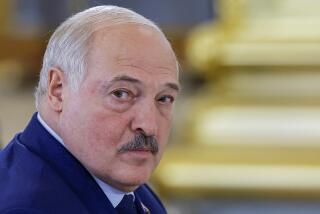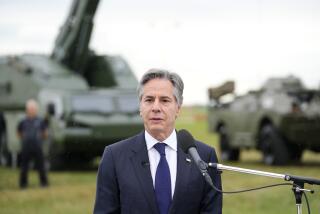From the archives: Czechs Remove Curb on Travel
- Share via
PRAGUE, Czechoslovakia -- Prime Minister Ladislav Adamec announced Tuesday that Czechoslovak citizens will no longer need exit permits to travel to Western countries, a move that signaled the first significant reverberations here from East Germany’s decision last week to open its borders to the West.
Although the lifting of the exit visa requirement is unlikely to release a flood of Czechoslovaks across the borders--as was the case in East Germany--the step will be welcome to citizens, who sometimes have to wait for two weeks to obtain the stamp in their passports that allows them to travel to the West.
The bureaucratic measure, a long holdover of Stalinist-style social control, has been employed often by the regime to prevent dissidents from traveling abroad. For ordinary travelers, however, the change, apart from removing an inconvenience, is not likely to mean much.
The regime was trumpeting the reform loudly, however. Announcing it to the Czechoslovak Federal Assembly, Adamec said his government considers “tourism as the citizens’ important right to get to know the world, gain experience and establish personal contacts.”
Adamec did not say when his government--which, except for Romania, remains the most resistant of East Bloc regimes to political liberalization--arrived at this new conviction. But the events of the last two weeks have given the Czechoslovak leadership a bracing indication of the new order in Eastern Europe.
The hard-line Communists in charge in Czechoslovakia have been rocked by the news from neighboring East Germany, where two weeks ago their longtime conservative ally Erich Honecker was replaced, along with his equally conservative Politburo. And over the weekend, another aging conservative, Todor Zhivkov in Bulgaria, was ousted in a move that certainly carried the approval of Soviet President Mikhail S. Gorbachev.
The Czechoslovak leadership, following in a direct line from the hard-liners who took over after the “Prague spring” reforms of 1968, has tried to maintain its tough stance in the face of reforms in Poland and Hungary. But the loss of East Germany from the conservative camp seems to have signaled to the authorities here that some concessions must be made to the new era.
The consternation--and evident confusion, some diplomats say--has been apparent in the mixed response to the recent rapid-paced events. Prague party leader Miroslav Stepan, in an address Tuesday, warned dissident and opposition groups against taking ideas of “dialogue” from “foreign radio broadcasts.” Such people, he said, “do not want to engage in dialogue, but only in criticism.”
The easing of travel restrictions is not likely to assuage the demands for democracy coming from opposition activists, whose frequent street protests have brought out police with truncheons and water cannons. The most recent incident was last month, when about 10,000 demonstrators were driven from Wenceslaus Square in the center of Prague.
In fact, much of the opposition--already abuzz with a sense of impending change--is likely to be encouraged by any reform step taken by the government as a further sign of its weakness and uncertainty.
Many opposition figures, in a mood markedly different from even six months ago, believe the regime is on its last legs and that major changes are likely in the coming year.
“The situation in Czechoslovakia is fascinating and absolutely unpredictable,” said Jan Urban, a member of Obroda, an organization of former Communists who were expelled by the party leadership after 1968. “But now there is light at the end of the tunnel.”
President Bush, speaking briefly to reporters Tuesday before a meeting with Tunisian President Zine Abidine ben Ali, praised Czechoslovakia’s decision.
“I’m very pleased about the whole move in Czechoslovakia,” he said. “The people of Czechoslovakia have the same aspirations for freedom that others have. I would expect we’d see further changes there just as we have seen in Poland, Hungary and the German Democratic Republic.”
Bush also denied reports that some members of his Administration fear that changes in Eastern Europe are moving too fast. “I don’t think it’s moving too fast,” he said. “I don’t know of anybody in my Administration who feels that.”
The Czechoslovak government took some steps last summer to ease travel restrictions but did not lift the exit visa requirement. Adamec did not say when the new rules will take effect, but they are expected to begin in January.
“The processing of travel documents is being speeded up,” Adamec said. “For travel to non-socialist countries and to Yugoslavia, exit visas will not be necessary.” Yugoslavia is a Communist country but is not aligned with the Warsaw Pact, so travel to it had been restricted.
Currently, Czechoslovak citizens wishing to travel West must apply for exit visas with the Interior Ministry. Before a trip is authorized, would-be travelers also must obtain stamps from their employers and from military authorities. There is a 30-day waiting period.
In July, the government lifted the rule requiring that invitations for Czechoslovak citizens to visit the West come from family members. It began recognizing invitations from anyone living in the West, including emigres, even those who had left their country illegally.
Czechoslovaks still will need visas from the countries they wish to visit. Adamec said the number of visits by Czechoslovak citizens to Western countries increased last year by 30% percent over the previous year.
“Our aim is that Czechoslovakia become a country for which travel and tourism represent not only a significant sum in the state budget, but also the satisfaction of its citizens,” Adamec said.
Times staff writer David Lauter, in Washington, contributed to this story.
More to Read
Sign up for Essential California
The most important California stories and recommendations in your inbox every morning.
You may occasionally receive promotional content from the Los Angeles Times.










